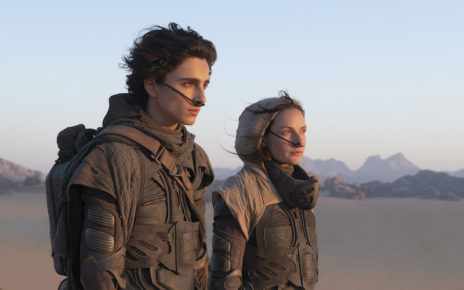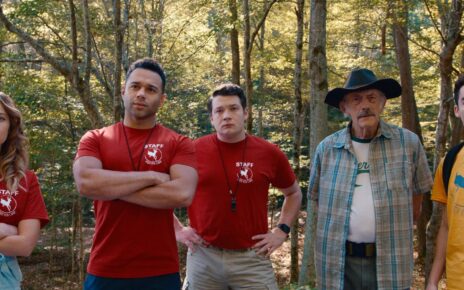Taboos. Why do they exist? Is it for our benefit? Is it for our repression? Both? Neither? Why is it necessarily awful to marry your sibling, partake in cannibalism, or mention a pitcher has a no-hitter going? How much worse off is society when these things happen? How much worse off are we? How big a deal should we make when a taboo is broken? Although some facets of these question are obvious, I don’t know the definitive answer to any of them. Yet part of me will respect most any film that attacks taboo with such vigor. Call Me by Your Name is all about taboo, although almost entirely unstated, which is, come to think of it, my favorite reason to like this film.
Elio (Timothée Chalamet) has to cede his room -reluctantly- to the summer border, Oliver (Armie Hammer). I might be a little miffed as well, but school is out and seventeen-year-old Elio has nothing to do but enjoy the Northern Italian climate and suck peach juice for months on end; he may as well have something to be pissed about. Professor Perlman (Michael Stuhlbarg) has a habit of dragging home PhD candidates for the summer, but we take it this is the first time he snagged The Lone Ranger. What does Ranger study? Hmmm, archaeology, maybe? Etymology? Entomology? Seismology? Cosmetology? You could convince me of any of these things. The Perlman household is one where ignorance comes to die. “Oh darn it, this book is in German. Well, I guess it’s my turn to translate, then.” Seriously, the languages of Italian, English, and French all find a good home here as well as a sampling of German and, if I’m not mistaken, Spanish. Yet it isn’t until after the 90-minute mark when a character first puzzles, “What did you say?”
This is the early 80s, so it’s not unreasonable to imagine an Italian John Travolta/Olivia Newton-John singing “Summer Lovin’ “ in the background while Elio and Oliver slowly fall for one another. The words “so wrong” don’t begin to describe this relationship. The taboos are, in no particular order: 1) A homosexual relationship in the middle of Catholic Italy 2) Oliver is a guest of Elio’s father 3) Oliver is student of Elio’s father 4) Oh, and here’s a big one: Oliver is a grown adult. Elio is, well, not quite a boy, but certainly not a man. As of this writing, Armie Hammer is 31 and Timothée Chalamet is 22; that doesn’t actually sound so hideous, but you’d swear in the film the elder was twice Elio’s age.
Call Me by Your Name constantly begs the question, “Is this wrong?” without ever really answering it. At one point, Oliver stops Elio’s advances with a “We haven’t done anything wrong yet.” This is the only time in the film the players examine the question. The movie leaves it to the audience to decide, which I greatly prefer. Part of me wishes to point out that the teen boy cougar fantasy is not an uncommon one. It’s less common on film, but not unheard of. Why should that be any different for homosexual boys? Is there something inherently wrong in their age difference? Do we think Elio enough of an adult to participate in a sexual relationship as an adult? If not, where’s the cutoff? This film loves to present the taboos at arms-length as if the two leads are immune to societal chagrin. Perhaps that’s the subtle curse – if you can find the mismatched summer relationship that lasts, bully for you. Is Call Me by Your Name secretly a sadistic film, one that lets love happen knowing that it can’t possibly end in happiness?
that’s the subtle curse – if you can find the mismatched summer relationship that lasts, bully for you. Is Call Me by Your Name secretly a sadistic film, one that lets love happen knowing that it can’t possibly end in happiness?
Oh, I’m gonna say this once, because I can now cite multiple films where this has happened — I’m not sure who you people are who get down on food, but if you’re gonna engage in sitophilia, could you at least dispose of the evidence afterwards? That’s just common sense.
Much as I appreciate where the film took me, I secretly didn’t feel much until the conclusion. The romance was nice, and one has to appreciate the acting choices Timothée Chalamet brought upon himself, yet I’ve always felt that a great romance makes you want to fall in love with the people who are falling in love. I’m not sure that’s the case here. But I wept openly for Michael Stuhlbarg’s big scene towards the end. Now is this because I identify more with the parent or because the romance took so long to develop? I want to say both.
♪Summer amore
Havin’ some fun
Summer amore
With my prof’s son
I met a man, we splashed in the brook
I met a boy, don’t give me that look
Summer glee in Italy
Hidden from, oh, all public sight
Tell me more Tell me more
Can that kid even drive?
Tell me more Tell me more
That guy looks thirty-five
We biked the town, ending in bliss
Hey, your parents, they ok with this?
Summer life absent of strife
Hidden from, oh, all public sight
Tell me more Tell me more
Cuz I feel like a dope
Tell me more Tell me more
Check it out, it’s the Pope!
Summer end, goodbye my friend
Now it’s me out of all public sight♫
Rated R, 132 Minutes
Director: Luca Guadagnino
Writer: James Ivory
Genre: That thin line between reflective art and irresponsible art
Type of being most likely to enjoy this film: LGBT citizens
Type of being least likely to enjoy this film: Those who live and die by dogma
♪ Parody Inspired by “Summer Lovin’ “



